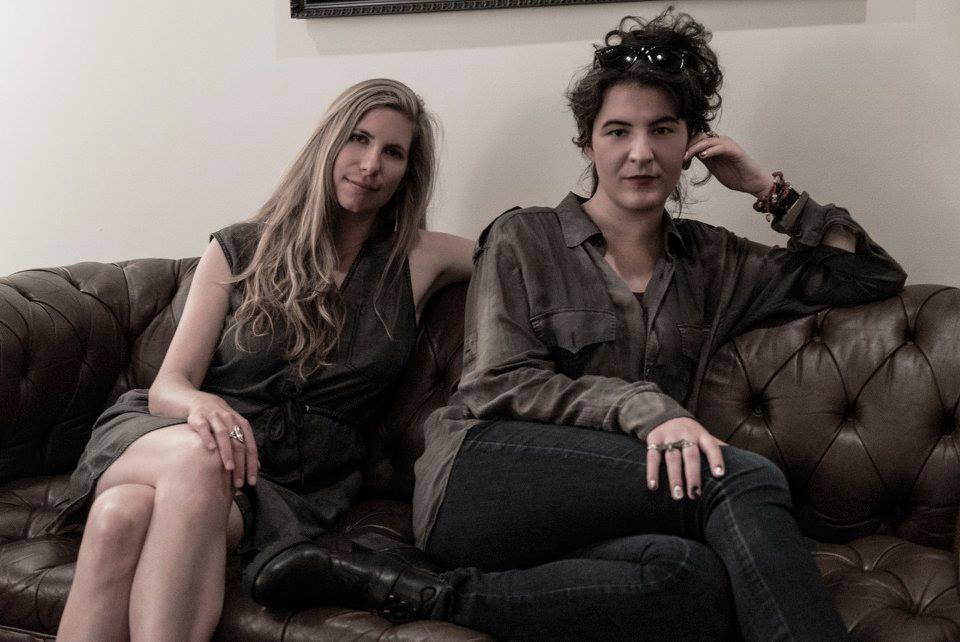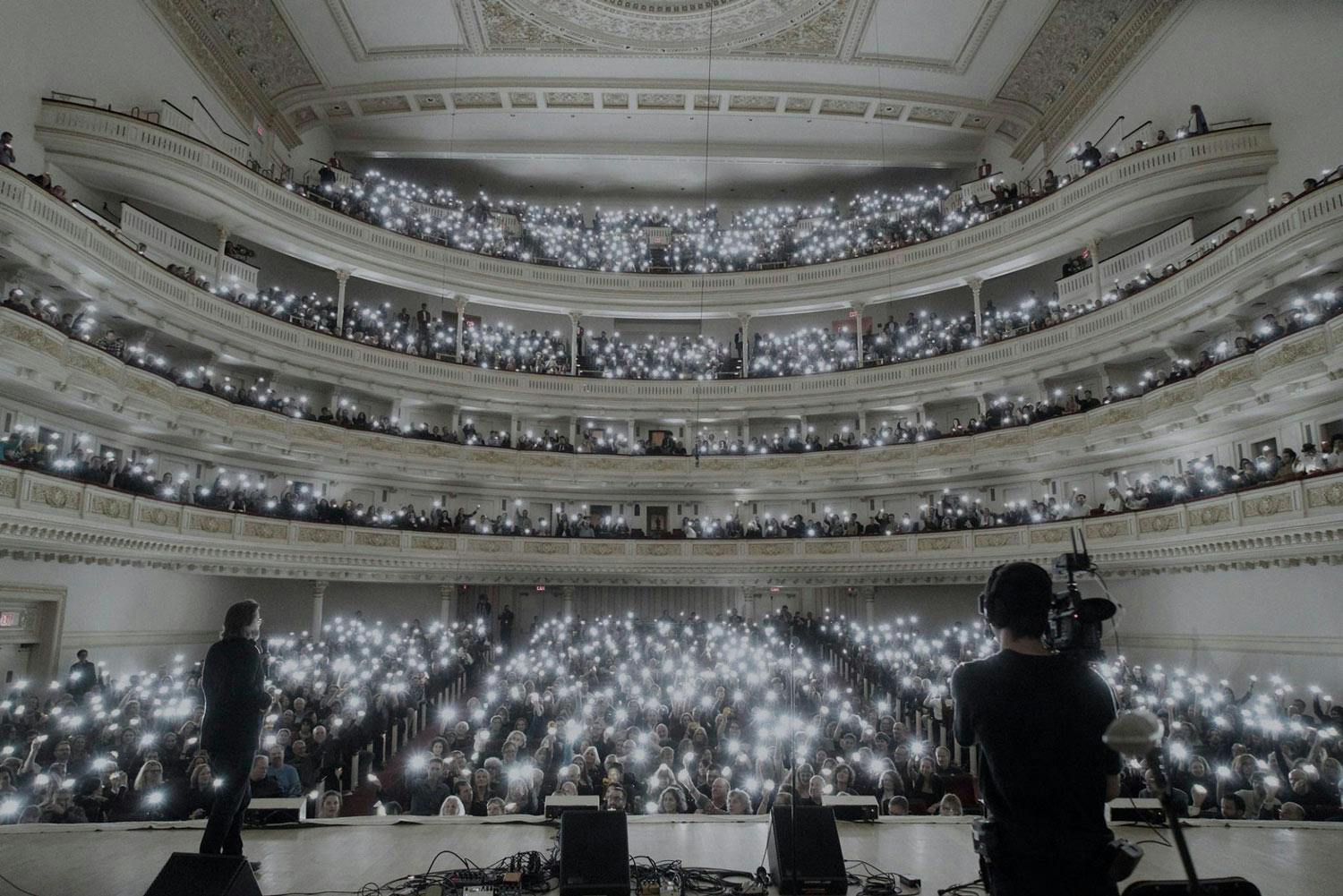Musical Revolution: A Q&A with Rebecca Foon
The co-founder of Pathway to Paris is prompting climate action through art.
Visual artist Olafur Eliasson leads a packed Carnegie Hall audience in creating a “sunrise” with solar-powered Little Sun lamps, at the December 2017 Pathway to Paris concert.
Juno-award winning composer and cellist Rebecca Foon is a collaborator — a member of numerous ensembles playing styles from post-punk to minimalist chamber music, she has also shared stage and studio with the likes of Nick Cave, Tanya Tagaq, and members of Arcade Fire. In recent years, this collaborative impulse led her down an unexpected path. Alongside fellow musician Jesse Paris Smith, Foon founded the environmental organization Pathway to Paris. Initially conceived as a one-off performance featuring REM’s Michael Stipe, environmentalist Bill McKibben, and punk legend Patti Smith (who shares daughter Jesse’s activism), Pathway has gone on to organize climate-action-focused concerts in Paris, Montreal, and Carnegie Hall.
The catalog of A-list collaborators has grown to include activists like Vandana Shiva and Naomi Klein, as well as musicians from rapper Talib Kweli, to the Red Hot Chili Peppers’ Flea, to folk icon Joan Baez. The project also has backing from the United Nations Development Programme. Co-founders Smith and Foon have expanded the organization’s activities to include the 1000 Cities Initiative for Carbon Freedom, a campaign supporting cities around the world to take climate action into their own hands.
But they also continue to put on star-studded concerts. This week brings Foon back to her West Coast roots — she grew up in Vancouver, where, full disclosure, our families are long-time friends — for a pair of concerts in San Francisco (September 14) and Los Angeles (September 16). After at least a decade out of touch, we recently reconnected to talk about music’s role in social change, people power, and being starstruck. (This interview has been edited for length and clarity.)
Jessie Johnston: What is Pathway to Paris?
Rebecca Foon: Jesse Paris Smith and I decided to organize a concert for the big climate march that happened in 2014 in New York City. That was in the lead up to the Paris [climate] talks in December 2015, so we called [it] Pathway to Paris. We organized it in five days, and it was a celebration of the momentous march that happened: over 300,000 people picketing in the streets of New York City alone, not to mention other cities of the world.
All these amazing people performed: Patti Smith, Michael Stipe, [Sonic Youth’s] Thurston Moore. Bill McKibben came out. We got it together so quickly, and we thought “Wow, this is incredible, all these artists want to be part of this.” Climate change is the most important issue of our time in terms of plain old survival on Planet Earth; it just seems like everyone’s terrified. Music is a powerful tool to wake people’s hearts up.
Then we decided to organize concerts in the lead-up to Paris. And we organized two in a beautiful theatre, Le Trianon, the first weekend of COP21 [the 2015 Paris Climate Conference]. Everything got shut down because of the Bataclan attacks [in November], so it was really a miracle it happened. It was a chance to bring a cultural movement to COP21, to open it with a bang of positivity, and show leaders and the world that a lot of people care about this and are watching. [Radiohead frontman] Thom Yorke played, and Flea, and Patti.
Climate change is the most important issue of our time in terms of plain old survival on Planet Earth.
The UN really was moved by it and became an official partner after that. Time went by, and then Trump did his thing, threatening to pull out of the [Paris] agreement, so we were like, “OK, we’ve got to keep going.” So we started a 501(c)3 [non-profit organization] and have been doing concerts ever since. We did one at Carnegie Hall last year, and launched the 1000 Cities Initiative at the UN.
These two concerts [in California] are trying to showcase the Global Climate Action Summit that’s happening in San Francisco, [with] the same intention of inspiring solutions to turn the Paris agreement into action and reality. Because it’s one thing to have it, and it’s another to actually make it happen.

Pathway to Paris co-founders Rebecca Foon and Jesse Paris Smith
What is the 1000 Cities Initiative?
It’s a solution we came up with — a global, theoretical solution — that if 1,000 cities can come together and hit very ambitious targets that we’ve outlined (to go 100% renewable and zero-emissions by 2040), then we can turn the Paris agreement into action. It’s not dependent on federal politics, it’s more focused on the cities that we live [in], our daily reality, community-building, and citizen engagement.
As part of 1000 Cities, we have an amazing technical team: we collaborate with Sustainability Solutions Group. They’ve come up with a great tool for cities that’s become prominently used in Canada, and now in America too. It helps cities model different scenarios to reduce their greenhouse gas emissions. So we help [cities] by offering support with this tool and helping them with their climate-action planning.
What we’re launching after the concert is the 1000 Cities research project, which will be looking at major cities of the world, where they’re at with their climate-planning efforts, and what it would take to ramp them up. And then setting targets for major cities of the world. Then [the research will] serve as a roadmap for everyone who’s out there trying to help cities. We’ll start it in October, and it will probably be a year-long project.
Music is a universal language, and climate change is a common truth and a global concern.
How can a concert bring about social and environmental change?
Obviously a concert doesn’t do a whole lot in terms of practical realities. But what it does do is open people’s hearts, and build inspiration and knowledge. I always say that music is a universal language, and climate change is a common truth and a global concern. And so we believe it’s a chance to build a revolution of sorts, to really raise awareness around climate-action planning and solutions. Show the world that people are concerned and care, and inject positivity. It’s such a scary time, but also an inspirational time.
And then we have — as part of 1000 Cities — a petition, so we mention that too. Every time somebody signs, the letter goes to the mayor’s office of that city. It’s global, citizens petitioning their cities to meet the 1000 Cities targets.
For those of us who haven’t attended a Pathway to Paris concert, can you describe what one of those evenings is like?
The San Francisco concert will be live-streamed [on the Facebook page of sponsor Ben and Jerry’s]. It’s a really beautiful experience: a combination of incredible thinkers, musicians, and artists that all come together in a collective effort. It feels very joyful and supportive — a diversity of voices that are all united.
I’ve seen images of the audience with their arms over their heads. What’s that about?
Tenzin Choegyal is a beautiful musician originally from Tibet that lives in Australia. During his portion of the evening, he gets everyone to put their hands over their head. I don’t know exactly how to articulate it, but [it symbolizes] “the roof of the world.”
Over the ten events you’ve organized so far, you’ve involved many impressive people. Were there any dreams come true, or people you found yourself starstruck to work with?
We’ve worked with so many people beyond my wildest dreams, that I never even imagined. What I like about it is breaking down the barriers.
I think the problem behind climate change — and inequity, injustice, war, and resource extraction — is a lack of love. Every human being has a right to our commons, and every human being is an equal part of our planet, even though society is constructed to make it clear that’s not the case. And so we work with all the souls that have joined Pathway to Paris. There’s a real diversity of voices, and it’s beautiful to see how much everybody equally cares for our future and the sustainability of our planet.
What I’m trying to say is I don’t get starstruck too much because I just try to see the light in everybody. But of course it’s been incredible to collaborate with so many people. [Grateful Dead co-founder] Bob Weir is performing at San Francisco; I never thought I’d ever meet Bob Weir. I’ve worked with Thom Yorke. It’s all been incredible, I just try to keep a level head about it all.
The problem behind climate change — and inequity, injustice, war, and resource extraction — is a lack of love.
Is there anyone you hope will get involved in the future?
We were going to ask Prince before he died, because he was doing a solo piano tour. So that was my big dream. Stevie Wonder, maybe. Aretha was on [the list]. Neil Young would be a big dream.
Your co-founder Jesse’s middle name is “Paris”…
It’s just a divine intervention of life! Hilarious, right? It’s a coincidence.
What has been the biggest surprise for you over the course of this project?
That Trump was elected and threatened to pull out of the Paris agreement. I have to say that shocked me. To be honest, I was surprised the Paris agreement happened. We were really worried that it wouldn’t come to fruition because of everything that happened with Copenhagen and the Kyoto accord.
It’s moving for us to see how many people have devoted themselves to the initiative and how much people care about the state of the world and climate change. They feel they don’t have a way to express it, and Pathway to Paris offers a platform for that. And I think that’s why we’re successful, really. We’re just finding a gap, and providing a platform for people to unite in a cause that’s so true to people’s hearts.
People do have power, and if everybody that cared put time and energy into doing something, we could make monumental shifts.
What’s the biggest thing you’ve learned through this project?
I think when you do things with love, it infuses into whatever you’re doing, and people feel it. I’ve really felt that with Pathway, and I try to take that in with everything that I do.
Jesse and I are just two people, and we’ve created a big thing out of nothing, really. At Carnegie Hall, everyone had paper and pen at their seat, and Bill McKibben asked the audience to write letters to [New York City] Comptroller Scott Stringer and Mayor Bill DeBlasio, asking them to divest New York City’s pension funds of fossil fuels and reinvest in renewables. We sent the letters, and a few weeks later they announced they were divesting.
It makes us realize that people do have power, and if everybody that cared about the state of the world put time and energy into doing something, we could make monumental shifts. The cool thing about climate change and the end of an era with fossil fuels, is that a renewable world is really fucking cool. How cool is it to live in a city without fossil fuels? A renewable city! That gets me excited to live on Planet Earth, you know?
